
"Get Back" is a song recorded by the English rock band the Beatles and Billy Preston, written by Paul McCartney, and credited to the Lennon–McCartney partnership. It was originally released as a single on 11 April 1969 and credited to "The Beatles with Billy Preston". The song is one of the few examples of John Lennon featuring prominently as lead guitarist. The album version of this song contains a different mix that features a studio chat between Paul McCartney and John Lennon at the beginning, which lasts for 20 seconds before the song begins, also omitting the coda featured in the single version, and with a final dialogue taken from the Beatles' rooftop concert. This version became the closing track of Let It Be (1970), which was released just after the group split up. The single version was later issued on the compilation albums 1967–1970, 20 Greatest Hits, Past Masters, and 1.

"Let It Be" is a song by the English rock band the Beatles, released on 6 March 1970 as a single, and as the title track of their album Let It Be. It was written and sung by Paul McCartney, and credited to the Lennon–McCartney partnership. The single version of the song, produced by George Martin, features a softer guitar solo and the orchestral section mixed low, compared with the album version, produced by Phil Spector, featuring a more aggressive guitar solo and the orchestral sections mixed higher.
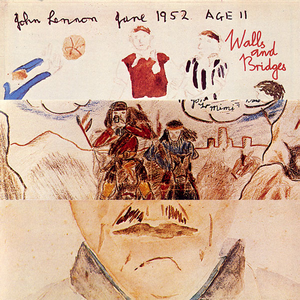
Walls and Bridges is the fifth solo studio album by English musician John Lennon. It was issued by Apple Records on 26 September 1974 in the United States and on 4 October in the United Kingdom. Written, recorded and released during his 18-month separation from Yoko Ono, the album captured Lennon in the midst of his "Lost Weekend". Walls and Bridges was an American number-one album on both the Billboard and Record World charts and included two hit singles, "Whatever Gets You thru the Night" and "#9 Dream". The first of these was Lennon's first number-one hit in the United States as a solo artist, and his only solo chart-topping single in either the US or Britain during his lifetime.

"Something" is a song by the English rock band the Beatles from their 1969 album Abbey Road. It was written by George Harrison, the band's lead guitarist. Together with his second contribution to Abbey Road, "Here Comes the Sun", it is widely viewed by music historians as having marked Harrison's ascendancy as a composer to the level of the Beatles' principal songwriters, John Lennon and Paul McCartney. Two weeks after the album's release, the song was issued on a double A-side single, coupled with "Come Together", making it the first Harrison composition to become a Beatles A-side. The pairing was also the first time in the United Kingdom that the Beatles issued a single containing tracks already available on an album. While the single's commercial performance was lessened by this, it topped the Billboard Hot 100 in the United States as well as charts in Australia, Canada, New Zealand and West Germany, and peaked at number 4 in the UK.

Abbey Road is the eleventh studio album by the English rock band the Beatles, released on 26 September 1969. It is the last album the group recorded, although Let It Be was the last album completed before the band's break-up in April 1970. It was mostly recorded in April, July, and August 1969, and topped the record charts in both the United States and the United Kingdom. A double A-side single from the album, "Something" / "Come Together", was released in October, which also topped the charts in the US.
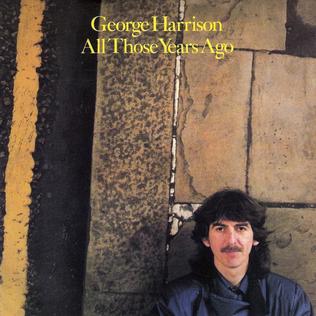
"All Those Years Ago" is a song by the English rock musician George Harrison, released in May 1981 as a single from his ninth studio album Somewhere in England. Having previously recorded the music for the song, Harrison tailored the lyrics to serve as a personal tribute to his former Beatles bandmate John Lennon, following the latter's murder in 1980. Ringo Starr is featured on drums, and Paul McCartney overdubbed backing vocals onto the basic track. The single spent three weeks at number 2 on the US Billboard Hot 100, behind "Bette Davis Eyes" by Kim Carnes, and it peaked at number 13 on the UK Singles Chart. It also topped Canada's RPM singles chart and spent one week at number 1 on Billboard's Adult Contemporary listings.
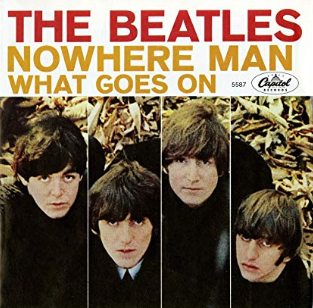
"Nowhere Man" is a song by the English rock band the Beatles. It was released in December 1965 on their album Rubber Soul, except in the United States and Canada, where it was first issued as a single A-side in February 1966 before appearing on the album Yesterday and Today. The song was written by John Lennon and credited to the Lennon–McCartney partnership. In the U.S., the single peaked at number 3 on the Billboard Hot 100 and number 1 on the chart compiled by Record World magazine, as it did the RPM 100 chart in Canada and in Australia. The song was also released as a single in some countries where it had been included on Rubber Soul, including Australia, where it topped the singles chart.

"Real Love" is a song written by the English musician John Lennon, formerly of the Beatles. He recorded six demos of the song in 1979 and 1980 with "Real Life", a different song that merged with "Real Love". In 1988, the sixth take was posthumously released for the documentary soundtrack Imagine: John Lennon. In 1995, his demo was completed by his former Beatles bandmates as part of the Beatles Anthology project, along with "Free as a Bird".

"Come Together" is a song by the English rock band the Beatles, written by John Lennon and credited to Lennon–McCartney. The song is the opening track on their 1969 album Abbey Road and was also released as a single coupled with "Something". The song reached the top of the charts in the United States and Australia, but peaked at No. 4 in the United Kingdom.

"Dear Prudence" is a song by the English rock band the Beatles from their 1968 double album The Beatles. The song was written by John Lennon and credited to the Lennon–McCartney partnership. Written in Rishikesh during the group's trip to India in early 1968, it was inspired by actress Mia Farrow's sister, Prudence Farrow, who became obsessive about meditating while practising with Maharishi Mahesh Yogi. Her designated partners on the meditation course, Lennon and George Harrison, attempted to coax Farrow out of her seclusion, which led to Lennon writing the song.

"I'll Follow the Sun" is a song by the English rock band the Beatles. It is a ballad written and sung by Paul McCartney and credited to Lennon–McCartney. It was released in 1964 on the Beatles for Sale album in the United Kingdom and on Beatles '65 in the United States. The band played the song on the BBC radio programme Top Gear, and the track was released on On Air – Live at the BBC Volume 2 in 2013.
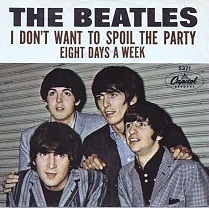
"I Don't Want to Spoil the Party" is a song by the English rock band the Beatles, written by John Lennon and credited to Lennon–McCartney. It was released on the album Beatles for Sale in the United Kingdom in December 1964. "I Don't Want to Spoil the Party" was also released on the Beatles for Sale EP.
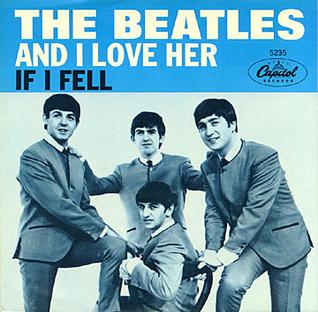
"And I Love Her" is a song recorded by English rock band the Beatles, written primarily by Paul McCartney and credited to the Lennon–McCartney partnership. It is the fifth track of their third UK album A Hard Day's Night and was released 20 July 1964, along with "If I Fell", as a single release by Capitol Records in the United States, reaching No. 12 on the Billboard Hot 100.
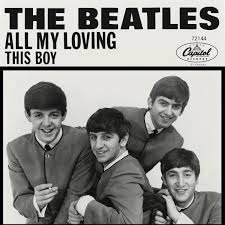
"All My Loving" is a song by the English rock band the Beatles, from their second UK album With the Beatles (1963). It was written by Paul McCartney, and produced by George Martin. Though not officially released as a single in the United Kingdom or the United States, the song drew considerable radio airplay, prompting EMI to issue it as the title track of an EP. The song was released as a single in Canada, where it became a number one hit. The Canadian single was imported into the US in enough quantities to peak at number 45 on the US Billboard Hot 100 in April 1964.

"Roll Over Beethoven" is a 1956 song written by Chuck Berry, originally released on Chess Records, with "Drifting Heart" as the B-side. The lyrics of the song mention rock and roll and the desire for rhythm and blues to be as respected as classical music. The song has been covered by many other artists, including the Beatles and the Electric Light Orchestra. Rolling Stone magazine ranked it number 97 on its list of the "500 Greatest Songs of All Time".

"You've Really Got a Hold on Me" is a song written by Smokey Robinson, which became a 1962 Top 10 hit single for the Miracles. One of the Miracles' most covered tunes, this million-selling song received a 1998 Grammy Hall of Fame Award. It has also been selected as one of The Rock and Roll Hall of Fame's 500 Songs that Shaped Rock and Roll. It was recorded by the Beatles for their second album, With the Beatles (1963). Many other musicians also recorded versions.

"Do You Want to Know a Secret" is a song by English rock band the Beatles from their 1963 album Please Please Me, sung by George Harrison. In the United States, it was the first top ten song to feature Harrison as a lead singer, reaching No. 2 on the Billboard chart in 1964 as a single released by Vee-Jay, VJ 587. In the UK, Billy J. Kramer released a cover of the song as his debut single, reaching No. 1 on the NME singles chart and No. 2 on the Record Retailer chart.
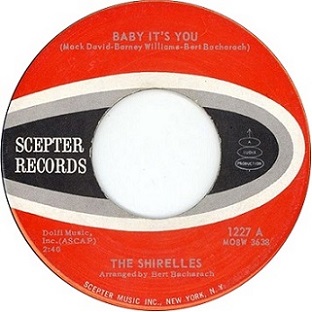
"Baby It's You" is a song written by Burt Bacharach (music), Luther Dixon, and Mack David (lyrics). It was recorded by the Shirelles and the Beatles and was a hit for both. The highest-charting version of "Baby It's You" was by the band Smith, who took the track to No.5 on the US charts in 1969.
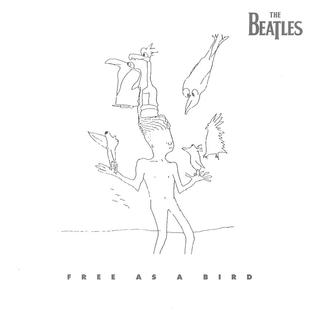
"Free as a Bird" is a single released in December 1995 by English rock band the Beatles. The song was originally written and recorded in 1977 as a home demo by John Lennon. In 1995, 25 years after their break-up and 15 years after Lennon's murder, his then surviving bandmates Paul McCartney, George Harrison and Ringo Starr released a studio version incorporating the demo.














